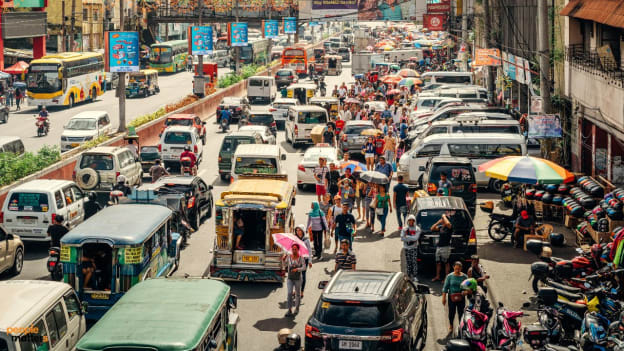Why the Philippines is among the world's worst countries for workers

MANILA – The International Trade Union Confederation (ITUC)'s 2024 Global Rights Index has once again highlighted a grim reality for labour rights in the Philippines, placing it among the bottom 10 countries worldwide.
This annual index critically evaluates nations based on the respect and enforcement of workers' rights, pinpointing those where conditions are most dire.
For the Philippines, the assessment reveals a substantial deficit in fairness and accessibility to workers' rights and work environments rife with unjust labour practices.
Consistently among the world's worst for workers
Since 2017, the Philippines has remained on this notorious list, consistently receiving a rating of five – symbolic of "no guarantee of rights." This rating, unchanged from the previous year, underscores a persistent challenge in the country: the formation of unions is fraught with obstacles.
Trade unionists often face severe threats, including death. Such conditions signify not only a disregard for worker safety but also a broader systemic failure to protect labour rights adequately.
The 2024 index also notes similar difficulties in other nations such as Bangladesh, Belarus, Ecuador, Egypt, Eswatini, Guatemala, Myanmar, Tunisia, and Turkey – countries that share the lowest ratings due to widespread violations and inadequate protection of workers' rights.
In stark contrast, nations such as Austria, Denmark, Germany, Iceland, Ireland, Italy, Norway, and Sweden have been adjudged the best for workers, achieving a rating of one. This indicates that violations of workers' rights are few and far between in these countries, setting a benchmark for effective labour rights protection.
Collaborative efforts needed to improve Filipino workers' plight
The continuous poor ranking of the Philippines serves as a sombre reminder of the pressing need for substantial labour reforms. It is a call to local and international stakeholders, including government agencies, labour organisations, and global watchdogs, to unite in addressing these deep-seated issues.
Collaborative efforts are essential to overhaul the labour landscape, ensuring that worker rights are not just recognised but staunchly upheld.
This consistent depiction of the Philippines alongside nations known for political instability and lax labour standards magnifies the severity of its labour issues. The perpetual struggle with unionisation and the safety of union members highlights critical areas needing urgent intervention from both local authorities and the international community.
Without significant improvements, the Philippines risks stagnation in labour rights progress, potentially exacerbating worker grievances and economic disparities.
Comparatively, countries with high ratings exemplify the positive outcomes of robust labour laws, comprehensive worker protections, and a societal commitment to supporting labour rights.
These nations offer valuable models for the Philippines, suggesting that targeted reforms and diligent policy implementation could substantially improve labour conditions. Learning from these examples could guide the Philippines towards better labour standards and greater economic equity.
Understanding and addressing these international disparities in labour rights is crucial for advancing global labour fairness and economic justice.
How to improve the welfare of workers
By focusing efforts on improving conditions in countries with poor labour records, like the Philippines, the global community can foster environments where all workers enjoy safe, fair, and dignified conditions.
This collective push for better labour standards is not only a moral imperative but also a foundational step towards broader social and economic stability across the globe.
To bolster the welfare of workers in the Philippines and similar nations, a multifaceted strategy involving both business and government action is crucial. These efforts aim to rectify the critical issues identified in the ITUC's 2024 Global Rights Index by adopting and adapting strategies proven successful in other countries with higher labour standards.
1) Strengthening legal frameworks
Government actions should focus on overhauling and fortifying legal frameworks to ensure that labour laws are comprehensive and enforceable and align with international standards. Key areas for legislative enhancement include union rights, collective bargaining, worker safety, and the protection of trade unionists from retaliation.
2) Enhancing enforcement mechanisms
Government agencies are tasked with bolstering the mechanisms that enforce labour laws. This enhancement could involve amplifying the resources and capabilities of inspection bodies, imposing stricter penalties for law violations, and setting up efficient systems to address workers' complaints promptly.
3) Promoting safe and inclusive unionisation
Business leaders and government officials need to foster an environment where unionisation is both safe and accessible. This effort includes safeguarding the right to unionise free from intimidation or violence, educating workers about their rights, and encouraging open dialogue among employers, unions, and government bodies.
4) Implementing corporate social responsibility (CSR) initiatives
Businesses are encouraged to initiate and strictly enforce CSR policies that not only meet basic compliance but actively enhance workers' conditions. Strategies might include adopting fair wage practices, investing in health and safety enhancements, and maintaining transparency in labour practices.
5) Establishing public-private partnerships
Collaborative efforts between governments and businesses in the form of public-private partnerships can be pivotal in elevating labour standards. These partnerships might focus on areas such as vocational training, workplace improvements, and creating economic opportunities that promote decent work.
6) Engaging in international cooperation
To elevate domestic labour standards, government leaders should engage in international dialogues and collaborations, leveraging insights from nations with exemplary labour practices. This global perspective can guide policy reforms and enforcement strategies that substantially improve local conditions.
This comprehensive approach is essential for sustainable enhancements in labour standards and for fostering broader economic and social stability worldwide.















